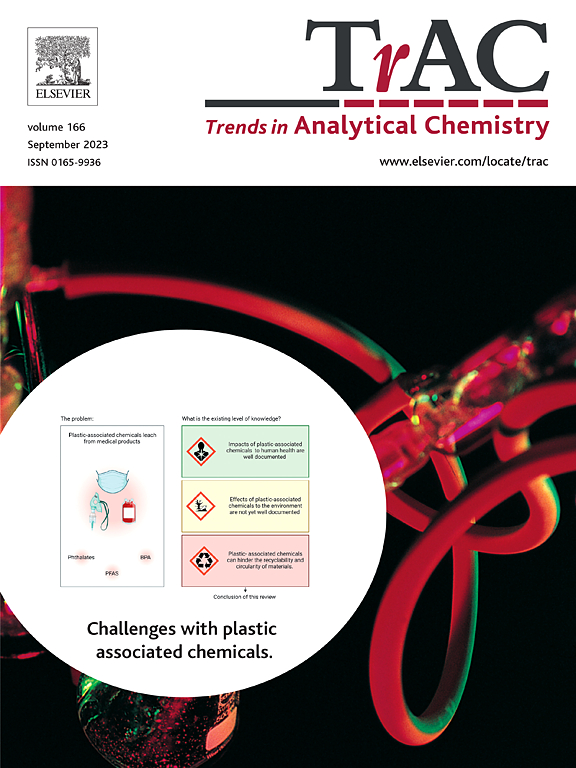Marine specialized metabolites: Unveiling Nature's chemical treasures from the deep blue
IF 11.8
1区 化学
Q1 CHEMISTRY, ANALYTICAL
引用次数: 0
Abstract
Marine specialized metabolites (MSM) represent a fascinating realm of chemical diversity with multifaceted functions across the spectrum of life on Earth. These metabolites serve as weapons, metal transporters, regulatory agents, and more. The conservation of genes responsible for their production over extensive evolutionary timescales underscores their selective advantage. Recent decades have witnessed an upsurge in MSM studies, driven by advancements in analytical techniques and the ever-growing accessibility of the aquatic environment. Marine macro and microorganisms offer a rich tapestry of specialized metabolites, some exhibiting potent activities in diverse domains, including medicine. The study of MSM presents several challenges, reflecting the need to separate complex mixtures into individual bioactive metabolites and utilize state-of-the-art extraction methods. Comprehensive structural analysis relies on advanced spectroscopic approaches, including nuclear magnetic resonance and mass spectrometry. These tools are instrumental in unravelling the chemical diversity of MSM and understanding their potential applications. While bioprospecting offers enormous potential, it raises critical challenges concerning sustainability, conservation, and equitable benefit-sharing. International protocols like the Nagoya Protocol seeks to regulate access to and share benefits from genetic resources, with considerable implications for marine bioprospecting. The convergence of advanced metabolomics, metagenomics, and synthetic biology offers promising avenues for accelerating the discovery and sustainable production of MSM, shaping the future of this field. This comprehensive review provides a deep dive into the challenges, methodologies, and emerging trends in studying marine-derived natural products, underscoring the immense potential of MSM for advancing chemical sciences and their transformative applications in diverse areas such as food, medicine, biotechnology, and environmental conservation. By bridging multiple disciplines, the continued exploration and sustainable utilization of these metabolites hold the promise of unlocking new innovations for society's benefit.
海洋特殊代谢物:从深海揭开大自然的化学宝藏
海洋特殊代谢物(MSM)代表了一个迷人的化学多样性领域,在地球上的生命光谱中具有多方面的功能。这些代谢物可作为武器、金属转运体、调节剂等。在广泛的进化时间尺度上,负责它们产生的基因的保存强调了它们的选择优势。近几十年来,由于分析技术的进步和水生环境的不断发展,男男性接触者的研究激增。海洋宏观和微生物提供了丰富的专门代谢物,其中一些在包括医学在内的不同领域表现出强有力的活动。男男性接触者的研究提出了几个挑战,反映了需要将复杂的混合物分离成单个生物活性代谢物,并利用最先进的提取方法。全面的结构分析依赖于先进的光谱方法,包括核磁共振和质谱。这些工具有助于揭示男男性接触者的化学多样性并了解其潜在应用。虽然生物勘探提供了巨大的潜力,但它也提出了关于可持续性、保护和公平利益分享的重大挑战。《名古屋议定书》等国际议定书旨在规范遗传资源的获取和惠益分享,这对海洋生物勘探具有重大影响。先进的代谢组学、宏基因组学和合成生物学的融合为加速MSM的发现和可持续生产提供了有希望的途径,塑造了该领域的未来。这篇全面的综述深入探讨了研究海洋衍生天然产品的挑战、方法和新兴趋势,强调了MSM在推进化学科学及其在食品、医药、生物技术和环境保护等不同领域的变革性应用方面的巨大潜力。通过连接多个学科,这些代谢物的持续探索和可持续利用有望为社会的利益解锁新的创新。
本文章由计算机程序翻译,如有差异,请以英文原文为准。
求助全文
约1分钟内获得全文
求助全文
来源期刊

Trends in Analytical Chemistry
化学-分析化学
CiteScore
20.00
自引率
4.60%
发文量
257
审稿时长
3.4 months
期刊介绍:
TrAC publishes succinct and critical overviews of recent advancements in analytical chemistry, designed to assist analytical chemists and other users of analytical techniques. These reviews offer excellent, up-to-date, and timely coverage of various topics within analytical chemistry. Encompassing areas such as analytical instrumentation, biomedical analysis, biomolecular analysis, biosensors, chemical analysis, chemometrics, clinical chemistry, drug discovery, environmental analysis and monitoring, food analysis, forensic science, laboratory automation, materials science, metabolomics, pesticide-residue analysis, pharmaceutical analysis, proteomics, surface science, and water analysis and monitoring, these critical reviews provide comprehensive insights for practitioners in the field.
 求助内容:
求助内容: 应助结果提醒方式:
应助结果提醒方式:


